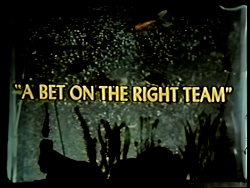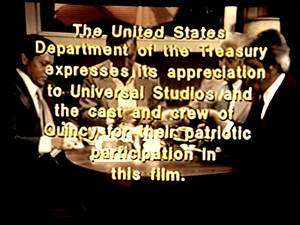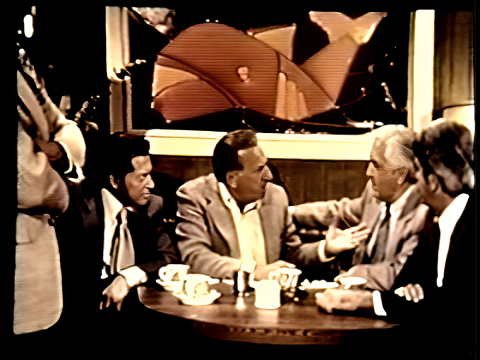A Bet On The Right Team (Quincy, M.E.)
| PSA: A Bet On The Right Team | ||||||||||||||||||||||||||||||||||||||
|---|---|---|---|---|---|---|---|---|---|---|---|---|---|---|---|---|---|---|---|---|---|---|---|---|---|---|---|---|---|---|---|---|---|---|---|---|---|---|

| ||||||||||||||||||||||||||||||||||||||
|
Episode Quote
"Hey Don't worry about Quince, he's a gambler, he's a great coroner, every team he bets on - is a stiff!"
~ Danny, in A Bet On The Right Team
Highlights
A Bet on the Right Team is a public service announcement (PSA) short featuring Jack Klugman in character as Dr. Quincy, M.E., produced by Universal MCA TV for the United States Savings Bonds program. The PSA was created in 1977 and was intended to promote public interest in purchasing U.S. Savings Bonds.
PSA Overview

A Bet on the Right Team is a 1977 public service announcement (PSA) produced by Universal MCA TV in support of the United States Savings Bonds program. Presented in the familiar style of Quincy, M.E., the short features Jack Klugman reprising his role as Quince in an off-duty setting that blends financial education with the series’ trademark conversational tone. Directed by Tom Belcher, the PSA was distributed for educational and promotional purposes rather than aired as part of the regular TV series.
The episode takes place after hours at Danny’s restaurant, where Quincy and his coworkers—Danny, Brill, bartender Johnny, and photographer Eddie—gather for a relaxed evening. As a conversation about betting on a ballgame unfolds, Quince seizes the opportunity to talk candidly with his colleagues about the realities of gambling. He compares the risky odds of placing a bet with the more reliable benefits of long-term financial planning. Rather than wager on a long shot, he advises, why not invest in a "lead-pipe cinch"—a slang term for a guaranteed success (see definition)—like U.S. Savings Bonds?
Quincy enthusiastically explains how he participates in the Payroll Savings Plan (PSP), using automatic deductions to buy Series E Bonds. The discussion covers a wide range of financial topics, including:
- How Series E Bonds are tailored to fit your income.
- The 6% annual interest rate (at the time) and steady compound growth.
- Tax deferral benefits—interest is not taxed until redemption or maturity.
- Converting matured E Bonds into Series H Bonds to continue deferring taxes.
- How this strategy can help build a retirement nest egg or fund a child’s college education.
- How bond earnings can be excluded from income if used for qualified education expenses.
- Filing arrangements to account for income earned from bonds in retirement, when taxes may be lower.
Quince’s guidance underscores the long-term advantages of planning ahead, and how investing in savings bonds offers both personal and national benefits. His coworkers respond with interest and curiosity, asking questions about taxes, retirement planning, and how to set up their own PSP accounts.
The PSA reflects a unique moment in television history where a fictional coroner offers practical financial advice—with accuracy and conviction. It’s a reminder that even after hours, Dr. Quincy remains committed to helping others make smart, informed choices—this time, about their futures.
Overview
Unlike standard episodes of Quincy, M.E., this PSA was not part of the show's regular broadcast schedule and was produced independently as a promotional educational film. The short film was directed by Tom Belcher and shot in Eastman color.
Music
Contrary to expectations, the episode does not use the familiar Quincy, M.E. theme—likely due to licensing and budgetary considerations. Instead, the background score features "Fresh Start", a track composed by John Fiddy. This piece originates from the KPM Music Recorded Library and was released in 1976 as part of the KPM 1000 Series: *Hot Wax*. Fiddy’s work under the KPM 1000 LP series has been widely used in commercial, industrial, and educational productions during that era. The selection of library music for this PSA likely reflects the project's public domain status and a need to avoid royalty complications associated with network television scores.
Film Details
Surviving prints of A Bet on the Right Team have occasionally surfaced among collectors. A 16mm Eastman color print was listed for sale on eBay as of August 11, 2024. This particular reel measured approximately 300 feet in length and was shipped on a 400-foot reel. Although the print showed some color fading typical of Eastman stock from the 1970s, it had been cleaned and serviced. There were six perforation repairs at the start and two splices within the film. Notably, the print showed no signs of vinegar syndrome, indicating it remains in stable condition despite its age.
Legacy
This short remains a unique example of mid-1970s cross-media promotion, using popular television characters to deliver government-endorsed messaging. Though rarely screened publicly, it holds interest for fans of the series and collectors of vintage educational and promotional film materials.
Bond Interest Rate Background
Bonds referenced in the PSA—specifically the Series E U.S. Savings Bonds promoted by Quincy—offered a fixed interest rate at the time of purchase.
Bonds issued in 1977 continued to earn the original 6% guaranteed rate for the first 5–10 years (depending on when they were redeemed or converted). They did not automatically increase in interest rate due to inflation or market changes in 1978 or 1979.
However, later Treasury changes (starting in 1980) introduced market-based rates for newly issued Series EE Bonds, replacing Series E Bonds entirely that same year.
In Summary:
- A 1977 Series E bond stayed at a 6% annual yield, unaffected by rising rates in 1978 or 1979.
- The rate did not go up, nor did it go down—it was fixed during that period.
- Inflation at the time was rising (between 7% and 13%), meaning real returns—adjusted for inflation—were gradually shrinking, even though the nominal interest remained constant.
Final Appeal
In the closing moments of the PSA, Jack Klugman steps out of character to address the audience directly—not as Quincy, but as himself. He reinforces the same message Quince delivered moments earlier: that investing in U.S. Savings Bonds is not just a smart personal decision, but a meaningful way to support the nation's economic strength. Klugman speaks sincerely about the importance of planning for the future—whether it's for retirement, education, or simply financial peace of mind—and how participating in programs like the Payroll Savings Plan makes that future more secure. His direct appeal serves as a bridge between fiction and reality, urging viewers to take action for both themselves and the country.

